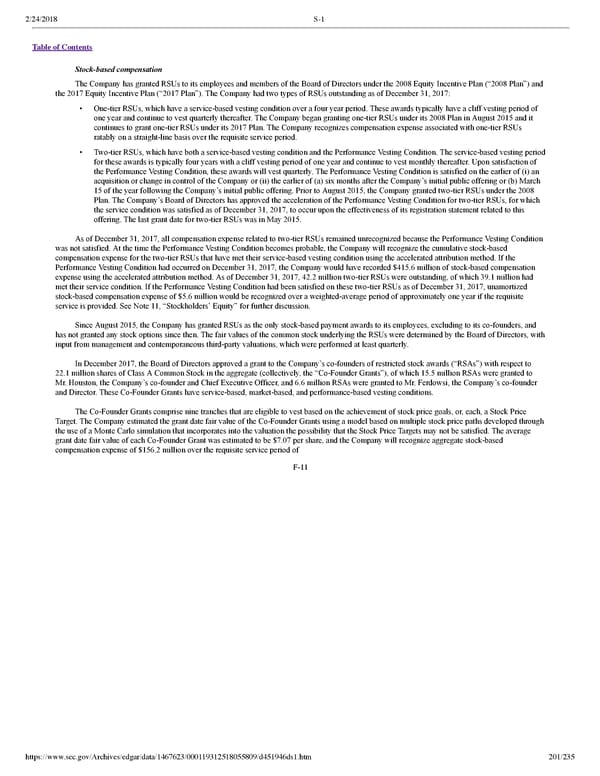2/24/2018 S-1 Table of Contents Stockbased compensation The Company has granted RSUs to its employees and members of the Board of Directors under the 2008 Equity Incentive Plan (“2008 Plan”) and the 2017 Equity Incentive Plan (“2017 Plan”). The Company had two types of RSUs outstanding as of December 31, 2017: • Onetier RSUs, which have a servicebased vesting condition over a four year period. These awards typically have a cliff vesting period of one year and continue to vest quarterly thereafter. The Company began granting onetier RSUs under its 2008 Plan in August 2015 and it continues to grant onetier RSUs under its 2017 Plan. The Company recognizes compensation expense associated with onetier RSUs ratably on a straightline basis over the requisite service period. • Twotier RSUs, which have both a servicebased vesting condition and the Performance Vesting Condition. The servicebased vesting period for these awards is typically four years with a cliff vesting period of one year and continue to vest monthly thereafter. Upon satisfaction of the Performance Vesting Condition, these awards will vest quarterly. The Performance Vesting Condition is satisfied on the earlier of (i) an acquisition or change in control of the Company or (ii) the earlier of (a) six months after the Company’s initial public offering or (b) March 15 of the year following the Company’s initial public offering. Prior to August 2015, the Company granted twotier RSUs under the 2008 Plan. The Company’s Board of Directors has approved the acceleration of the Performance Vesting Condition for twotier RSUs, for which the service condition was satisfied as of December 31, 2017, to occur upon the effectiveness of its registration statement related to this offering. The last grant date for twotier RSUs was in May 2015. As of December 31, 2017, all compensation expense related to twotier RSUs remained unrecognized because the Performance Vesting Condition was not satisfied. At the time the Performance Vesting Condition becomes probable, the Company will recognize the cumulative stockbased compensation expense for the twotier RSUs that have met their servicebased vesting condition using the accelerated attribution method. If the Performance Vesting Condition had occurred on December 31, 2017, the Company would have recorded $415.6 million of stockbased compensation expense using the accelerated attribution method. As of December 31, 2017, 42.2 million twotier RSUs were outstanding, of which 39.1 million had met their service condition. If the Performance Vesting Condition had been satisfied on these twotier RSUs as of December 31, 2017, unamortized stockbased compensation expense of $5.6 million would be recognized over a weightedaverage period of approximately one year if the requisite service is provided. See Note 11, “Stockholders’ Equity” for further discussion. Since August 2015, the Company has granted RSUs as the only stockbased payment awards to its employees, excluding to its cofounders, and has not granted any stock options since then. The fair values of the common stock underlying the RSUs were determined by the Board of Directors, with input from management and contemporaneous thirdparty valuations, which were performed at least quarterly. In December 2017, the Board of Directors approved a grant to the Company’s cofounders of restricted stock awards (“RSAs”) with respect to 22.1 million shares of Class A Common Stock in the aggregate (collectively, the “CoFounder Grants”), of which 15.5 million RSAs were granted to Mr. Houston, the Company’s cofounder and Chief Executive Officer, and 6.6 million RSAs were granted to Mr. Ferdowsi, the Company’s cofounder and Director. These CoFounder Grants have servicebased, marketbased, and performancebased vesting conditions. The CoFounder Grants comprise nine tranches that are eligible to vest based on the achievement of stock price goals, or, each, a Stock Price Target. The Company estimated the grant date fair value of the CoFounder Grants using a model based on multiple stock price paths developed through the use of a Monte Carlo simulation that incorporates into the valuation the possibility that the Stock Price Targets may not be satisfied. The average grant date fair value of each CoFounder Grant was estimated to be $7.07 per share, and the Company will recognize aggregate stockbased compensation expense of $156.2 million over the requisite service period of F11 https://www.sec.gov/Archives/edgar/data/1467623/000119312518055809/d451946ds1.htm 201/235
 Dropbox S-1 | Interactive Prospectus Page 200 Page 202
Dropbox S-1 | Interactive Prospectus Page 200 Page 202